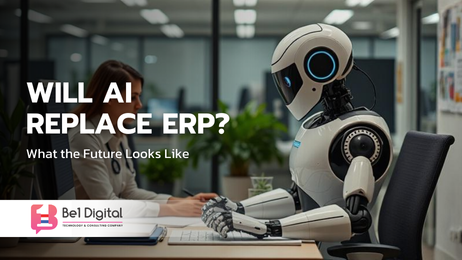
How ERP Helps Reduce Waste and Makes Businesses More Sustainable
Sustainability is becoming a top priority for businesses worldwide. As companies strive to reduce waste, cut costs, and lessen their environmental impact, Enterprise Resource Planning (ERP) systems have emerged as a powerful tool to help achieve these goals. ERP not only improves business efficiency but also supports sustainable practices by reducing resource waste, optimizing supply chains, and promoting eco-friendly operations.
How ERP Reduces Waste in Businesses
- Minimizing Material Waste in Production Manufacturers often face challenges with excess raw materials and defective products. ERP systems help by:
- Optimizing production schedules to prevent overproduction
- Tracking raw material usage to reduce excess waste
- Identifying defects early to minimize rework and material loss
- By enhancing production planning, businesses can significantly reduce waste and cut costs.
- Reducing Paper Waste with Digital Documentation Traditional business operations rely on paper-based processes, leading to significant paper waste. ERP systems digitize records such as invoices, contracts, and reports, reducing the need for physical copies.
- Electronic invoicing lowers paper usage.
- Cloud storage eliminates the need for printed files.
- Automated approvals reduce the need for printed forms.
- Going digital not only benefits the environment but also speeds up workflows and enhances security.
- Optimizing Inventory Management to Prevent Overstocking Poor inventory management often leads to product spoilage, waste, and unnecessary storage costs. ERP systems provide real-time inventory tracking, allowing businesses to:
- Maintain optimal stock levels.
- Predict demand accurately using data analytics.
- Reduce expired, damaged, or unsold products.
- By preventing overstocking and understocking, businesses can reduce waste while improving cash flow.
- Enhancing Energy Efficiency ERP systems monitor and optimize resource consumption, resulting in lower energy costs and reduced carbon footprints. Features include:
- Monitoring energy usage in real-time
- Identifying inefficiencies in equipment and processes
- Automating energy-saving measures, such as shutting down unused machines
- By using ERP, businesses can reduce electricity, water, and fuel consumption, making their operations more environmentally friendly.
- Optimizing the Supply Chain for Sustainability A sustainable supply chain reduces waste, emissions, and costs. ERP helps by:
- Choosing eco-friendly suppliers through vendor evaluation tools
- Reducing transportation waste by optimizing delivery routes
- Cutting packaging waste with more efficient logistics
- A well-managed supply chain ensures that businesses operate efficiently and responsibly.
- Supporting Compliance with Environmental Regulations Many industries face strict environmental regulations regarding waste disposal, emissions, and sustainability. ERP systems help businesses stay compliant by:
- Tracking waste disposal practices
- Monitoring carbon emissions
- Generating sustainability reports for audits
- This ensures that businesses meet legal requirements while reinforcing their commitment to sustainability.
- Encouraging a Sustainable Work Culture ERP systems raise employee awareness of sustainable practices by promoting:
- Paperless operations
- Energy-saving workflows
- Eco-friendly supply chain management
- By integrating sustainability into daily operations, ERP fosters a culture of responsibility and efficiency.
Why ERP is a Game-Changer for Sustainable Business
By integrating ERP into business operations, companies can:
- Reduce waste, costs, and inefficiencies
- Improve energy efficiency and resource management
- Ensure compliance with sustainability regulations
- Build a stronger brand image as an eco-friendly company
Sustainability is not only good for the planet—it’s also a smart business strategy that enhances profitability and long-term success. ERP is more than just a business management tool—it’s a sustainability enabler. By reducing waste, optimizing resources, and promoting responsible operations, ERP helps businesses become greener, more efficient, and more profitable.
If your company aims to reduce costs while promoting environmental sustainability, investing in an ERP system is a smart move.
Need an Experienced Business Consultant?
- K.Boonyasak (Toon)
- 063-660-4119
- boonyasak.s@be1digital.co.th
- K. Supaporn ( Meaw)
- 089-998-3004
- supaporn.be1group@gmail.com
Recent Posts





